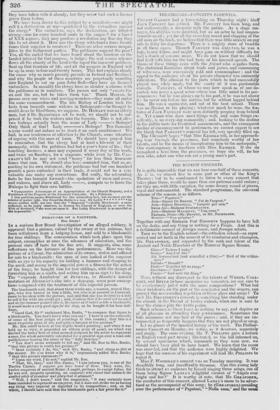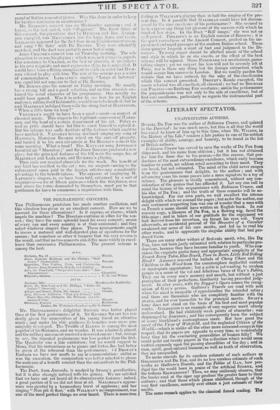THE BENEFIT CONCERTS.
Tr is quite impossible that we can hear one-half of these concerts. As it is, we almost live in some part or other of the King's Theatre ; but to be condemned to listen to every concert that takes place there, would be more than our patience could endure; for they are, with little variation, the same dreary round of pieces, • vocal and instrumental. The standard programme, the universal scheme of the season, is as follows.
Trio—" Papataci." Aria—Signor De BEGNIS, `,` J'ai de l'argent."
Aria—Signor DONZELLI, " Languir per una." Swiss Air—Madame STOCKHAUSEN.
Aria—Madame MALIBRAN, " Una voce." Fantasia, Flute—Mr. DROUET, or Mr. NICHOLSON.
Ductiv--.., Non pnlpiter."
Together with any Sinfonia that GOODWIN happens to have left on the desks, and any thing or nothing for a Finale. And this is a fashionable concert of foreign music, and foreign artists. Turn we to the English school—the orthodox school—as repre sented and set forth in the concert of its conductor and champion, Mr. GREATOREX, and supported by the rank and talent of the Ancient and Noble Directors of the Hanover Square Rooms.
Glee—" To love I wake."
Song—" Angel of life." Air, harmonized (and miscalled a Glee)—" Bird of the wilder- ness."
" Donald."
Duet—" Together let us range" Overture—" Zaira."
Finale—" God save the King."
Now, without any disrespect to the talents of WEBER, CALL- COTT, and BOYCE (whose memories we venerate), are our ears to he everlastingly jaded with the same compositions ? What but sheer indolence, on the part of the conductor and the singers, can prompt this never-ending repetition of these glees and songs? To visit Mr. GREATOREX'S concert, is something like standing under the church in the Strand at twelve o'clock, when one is sure to hear the chimes play the 104th psalm. Such schemes as these leave us nothing to say, and deprive us of all pleasure in attending their performance. Sometimes the bills announce not one half of the pieces ; and, if they are an- nounced, it as frequently happens that they are not played or sung. Let us glance at the musical history of the week. The Philhar- - monic Concert on Monday, we notice, as it deserves, separately and singly. The same evening Mr. T. PHILIPPS gave a lecture on English vocal part music ; illustrated, as the bill informed us, • by several specimens which, inasmuch as they were new, we should have been glad to have heard. We learn that the room was crowded, and that the audience were highly delighted. We hope that the success of his experiment will lead Mr. PHILIPPS to repeat it.
Miss F. WOODRAM'S concert was on Tuesday morning. It was dreadfully long, and insufferably tiresome. Can this young lady think to attract an audience by herself singing three songs, one of them being Signor LANZA'S delightful version of "Angels ever bright and fair ?" It is worthy of note, that Mr. GREATOREX, the conductor of this concert, allowed LANZ A:s name to be adver- tised-as the accompanist of this song ; he (Gaza:maim) presiding over the performance of " Papataci," " Nella casa," and the usual..
round of Italian concerted pieces. Was this clone in order to keep his brother conductor in countenance ?
Mr. ELIASON'S concert was on Wednesday morning ; and it began, as the last endA, with " Papataci." The finest thing of this concert, the pianoforte duet by HUMMEL and Mrs. ANDER- SON excepted, was MAYSEDEWS trio for harp, horn, and violin. LABLACHE appeared for the first time in an English concert-room,
and sung " Se fiato" with DE BE They wer:: admirably matched, and the duet was probably never better sung. Jons CRAMER'S concert was on Thursday moaning. The sole attraction to us was his playing ,• which was, as it always is, superb. Our constancy to CRAMER, as the first of pianists, is unshaken : in his own exquisite and most expressive style, he is unrivalled. It would have been a fitting compliment to such an artist had Hum-
BIEL offered to play with him. The rest of the scheme Nva,; a series of commonplaces. LABLACHE'S singing " Largo al flictotinn" was equal but not superior to that of DE BEGNIS.
DE BEGNIS gave his concert on Friday morning. He usually has a strong bill and a good selection, and on this occasion sus- tained the usual character of his programme. One novelty we could have spared. Was it in order to see how fir au English audience, calling itself fashionable, would bear to be insulted, that he and MALIBRAN indulged them with the slang duet of MAZE INGHI, " When a little farm we keep ?"
VAUGHAN'S ought to have been a good concert—a concert of classical music. This singer is the legitimate successor of HARRI- SON, and the head of a certain depaxtment of his art. Policy as well as pride should have led him to exert himself to uphold it. But his scheme was sadly destitute of the features which ought to have marked it. VAUGHAN having declined sinaing• any song of HANDEL'S, Monsieur BEGREZ seized on the cast-off property, and turned it to his own advantai,'e at DE BE GNIS'S concert the same morning. What a treat ! Mrs. KNYVIcTT sung ATTWOOD'S beautiful air " Marraton ' ." and Sir JOHN ROGERS produced a new glee ; but the principal features of the bill were the songs, &c. of MALIBRAN and LABLACHE, and HUMMEL'S playing. Thus ends our musical chronicle for the week. No benefit of any kind has resulted to the art ; nor, we suspect—owing to the extravagant sums paid to the foreign artists—any considerable advantage to the benefit-takers. The expense of employing M. LAPORTE'S singers, is., we-have been told, enhanced by a sort of seigmorage—a fee of fifteen guineas—which the bjni9lciare, over and above the terms demanded by themselves, must pay to that gentleman for leave to commence a negotiation with them.



















 Previous page
Previous page